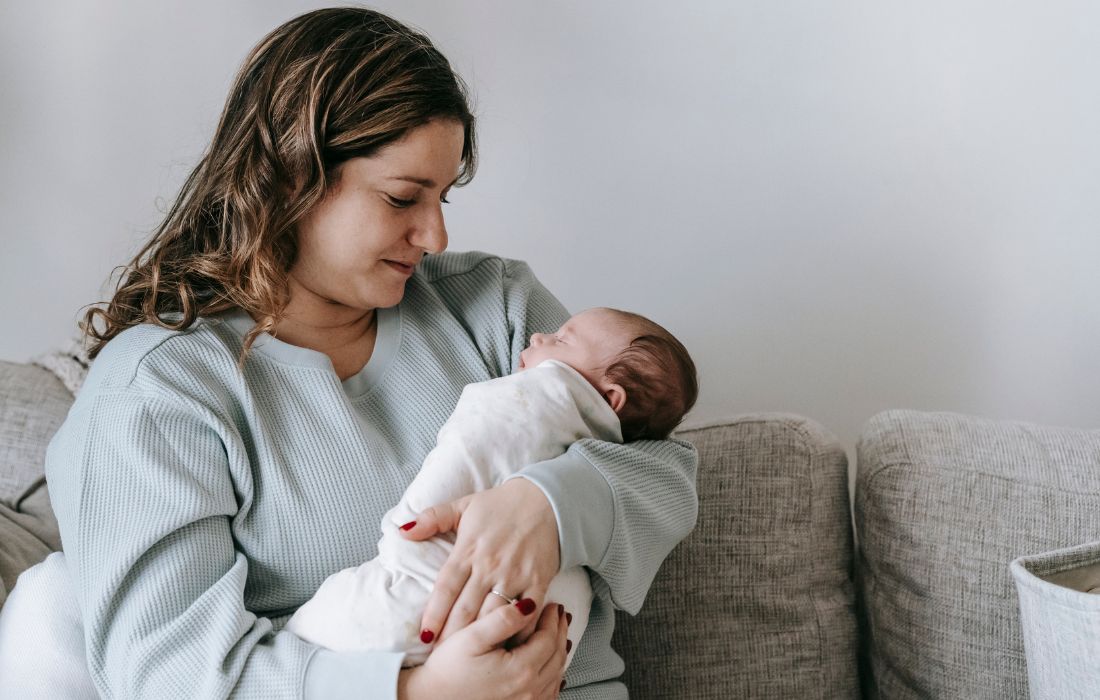How to Bond With Your Newborn To Help Them Sleep Better
Believe it or not, you can actually improve your newborn’s sleep from something as simple as cuddling, talking softly, and speaking reassuring phrases such as “It’s okay” or “There, there” in your bedtime routine. It’s true!
Dr. Douglas Teti, a professor of psychology at Pennsylvania State University, has been conducting longitudinal work as part of the Study of Infants’ Emergent Sleep Trajectories (yes, it’s known as SIESTA). He used the Emotional Availability Scales to look at the correlation between emotional availability and sleep in 35 families with children ranging from 1 month to 2 years of age.
He found that “infants of mothers with high emotional availability had fewer bedtime disruptions and woke up less during the night.” I bet the same findings would be true for fathers, too.
Examples of emotional availability are parents cuddling and talking softly to their infants at bedtime. Reassuring phrases and soothing tones create a peaceful environment for your baby to feel safe and secure to fall asleep.
Why Emotions Impact Your Newborn’s Ability To Sleep At Bedtime
Bedtime routines give a lovely opportunity to connect and bond emotionally with your baby. I suggest not bringing a phone or tablet into your baby’s sleep area. I know this can be hard but believe me, it’s worth it. Make time for kissing, hugging, and snuggling during the various steps in their soothing bedtime routine.Dr. Teti’s work has broader implications that bedtime cuddling equals improved baby sleep. Emotional availability is about more than putting the baby to bed; it’s about how we relate to our children overall. When we are fully present with our babies, they feel secure, and that helps them feel safe falling and staying asleep.
Ways to Bond That Help Your Infant Sleep Better
Here are some of the easiest ways to nudge attachments along (some of which may be intuitive to you).
Create Routines and Predictability In Your Baby’s Schedule
To feel safe and secure, babies need to know that they can count on you. Routines help meet this need for predictability and thus are an important part of your baby’s life. Routines let your baby learn I know what’s coming next, which is comforting. While in utero, everything in your baby’s world was fairly simple and consistent. They were in a warm environment, fed constantly, and comforted by the soothing sound of Mom’s heartbeat. Once born, they entered a world that was new and unfamiliar, filled with foreign sights, sounds, and smells. The more consistently you comfort your newborn, the more safe and secure they are likely to feel.
We all have routines for our days. Most of us wake up in the morning and fall asleep at the end of the day at predictable times, work certain hours, eat around the same times every day. Routines bring structure to our lives, and structure and predictability help us feel secure. Putting routines in place for your baby will do the same and bring about positive benefits for your child and for your family as a whole.
You can begin to weave small routines into your days and evenings as early as your newborn’s third week. Start by taking a morning walk, practicing tummy time midday, reading to them in the afternoon, and/or giving them a nice warm bath and a massage in the evening before you put your newborn to sleep.
Your goal is to create routines that your baby can expect and count on—and not just at bedtime, mealtime, and bath time. For example, you might have a special toy for diaper changes or a favorite song as you start your daily walk.
Bedtime routines can help your baby fall asleep faster and help defuse nighttime fussiness. Some babies fall into routines easily, while others may take some time to adjust. Believe it or not, it only takes a week (or less) for most young babies to acclimate to new routines.
4 Areas To Build Routines To Promote Good Newborn Sleep
1. Feeding
Build some familiar routines around feeding. Some parents have a favorite chair they sit in while feeding their baby or use a special feeding pillow. Don’t overthink this, it’s fine to be in different places to feed your baby. The point is to create cues your baby knows it’s time to eat.
Remember, feed your baby with the first hunger cues you notice. I’m sure you know by now that feeding an angry newborn isn’t easy. It takes them a while to settle before eating calmly.
2. Playtime
Give your baby regular tummy time on the same blanket or play mat. Use this blanket or play mat around the same time every day. Be sure to engage a little with your baby too, this can make tunny time last longer. Your little one will want you close for quite some time and tummy time is no exception.
It’s also as easy as making sure they’re full and reading them a short book. New babies love your voice and find comfort in hearing you talk.
3. Naps
Try to do the same two or three things prior to putting your baby down for each nap. These can be simple and quick, like singing a little lullaby and swaddling them.
It’s also as easy as making sure they’re full and reading them a short book. New babies love your voice and find comfort in hearing you talk.
4. Bedtime
Establish a few cozy and relaxing steps before putting your baby down for the night. Baths, books, and massage are all wonderful routines you can start early on. Try not to get too caught up with rigid schedules or following the clock to the minute. But do try to set up a nice consistent flow to your day, where you do things in the same order on a regular basis.
Newborns typically sleep, eat, have a brief period of activity, and then begin to get tired again. You can use this natural cycle as your framework. Observe your baby’s patterns to determine their natural flow and blend your routines in. You got this!
Other Ways To Bond With Your Newborn To Support Their Sleep
Respond to your newborn’s needs promptly
No, you don’t need to run; just let them know you heard them and will be there as soon as you can. This is an easy way to build a bond with your baby. If they cry because they are wet, changing them lets them know you’ve heard them. If they make hungry noises, feeding them teaches them what they need to feel better, and that you can be trusted to help. If you can’t address their needs immediately, if possible, talk to them while you finish whatever you’re doing (such as taking care of another child). You can’t spoil your baby by being “too responsive” in the first few months of life.
Hold Them!
Hug your baby, cuddle them, look into their eyes, and when they coo at you, coo back! Strap them onto your chest or use a sling rather than a stroller when it works for you. Sucking, touch, and warmth all release the calming chemical oxytocin in a baby’s brain, which can bring down stress levels. On the other hand, you don’t have to “wear” your baby every minute, and it’s not a crime to use a bouncy seat some of the time. Remember that babies need and enjoy stimulation from baby gyms, tummy time, and the like, too, so you don’t need to hold them all of the time.
Our Team Is Here To Help Your Newborn & Family Get Good Sleep!
Being a new parent or adding another baby to the family’s hard work. You don’t need to do it alone and we consider ourselves part of your village. After helping over 20,000 families with success, I’m confident we can help your newborn sleep better too!




